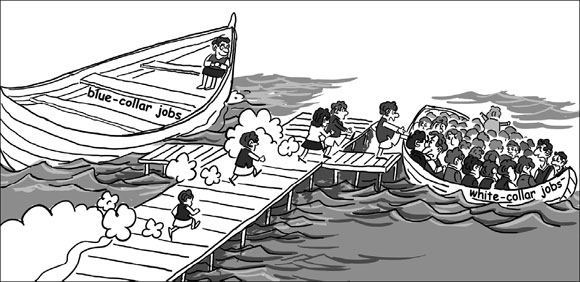Too much focus on corporate employment
Updated: 2007-12-06 06:47
Most middle-class parents wish to see their sons find employment in the corporate world. They imagine him browsing through files behind a desk, dressed in slacks, shirt, and a tie. We do not hear children, regardless of economic background, aspiring to become anything less than a doctor, engineer, architect, civil servant, teacher and so on.
Even the picture of a future graduate, as seen in newspaper advertisements of private universities, colleges, and jobsites is usually that of a corporate executive dressed in French cuff shirt and a sharp tie.
But there are hardly any advertisements from institutions offering education leading to future careers as nurses, chauffeurs, auto mechanics, electricians, carpenters or masons. These professions have no glamour, but imagine a world without them. People engaged in these lines of work are the ones that build a nation.
And interestingly, both demand for employment and wages in these sectors are growing at a faster rate than that of the corporate world.
The number of educational institutions in Bangladesh, which offer higher studies, has grown significantly in recent years. Unfortunately, the same cannot be said about the quality of the education.
As a matter of fact, I believe that the expansion in the number of units has come at the expense of quality. The proof is in the number of institutions closed in recent years due to substandard quality of education, and for fraud.
Nevertheless, even today, many private universities and colleges, having no permanent campus or adequate facilities, offer nothing more than a very basic education provided by inexperienced and unqualified faculty. With a few exceptions of course.
In today's world of technology, information, and globalization, a lot more than a university degree is required to be a successful corporate executive. Each year, more and more local graduates, armed with a basic degree from makeshift local institutions, enter the race for employment with hopes of landing the dream job as a corporate executive.
Unfortunately, most join the glut of "university educated" unemployed youths, since the limited number of available corporate jobs goes to the top graduates from a handful of institutions. Even expatriate Bangladeshis and foreign nationals, due to the insufficiency of locally available qualified personnel, are filling senior level corporate openings.
Institutions specializing in technical education except those related to computer and mobile technology, have not had much growth in quantity or in quality.
An anomaly indeed, considering the growth in demand and rising wages in jobs related to such specialized training. Part of the reason could be the lack of respect we have for such careers, and our fascination with corporate desk jobs.
The rest can be attributed to the lack of government and private initiatives, coordination among labor related government and semi-government agencies, and most importantly, absence of legislation regarding vital labor issues such as minimum wage, employee rights, employer responsibilities, working conditions, worker's protection and so on.
I was clueless when it came to hiring a chauffer recently. The most effective method seemed to be "word of mouth" spread through other drivers in my apartment complex and those working for other members of my family.
It took me more than two weeks to find someone, and once satisfied after having tested his driving skills, I was faced with an array of decisions: How much do I pay him? What would be his/her responsibilities? Working hours and holidays? Bonuses? Meal breaks? Rest periods? What should my chauffer expect from me? What kind of working environment must I provide?
It may seem insignificant to discuss the employment of a chauffer but, lest we forget, a large number of individuals are engaged in this profession, earning an average of $1,000 or more per year.
I was guilty of the common prejudice toward certain professions as a result of growing up in a developing country. But my views changed when I landed in the United States as a student at the age of 17, with just enough money to cover tuition and boarding for the first semester only.
Since then, I had worked as a cleaner, day laborer, security guard, switchboard operator, pizza delivery guy, toll collector, taxi driver, and as a waiter before I embarked on a professional career following graduation.
I cannot say I enjoyed all the jobs, because sometimes I did not have a choice. However, I did have fun working as a cab driver and a waiter. These were well-paid jobs that involved service at a personal level.
I had the opportunity to serve and meet many interesting people, including my first girlfriend in the US, and many future friends since they were customers at the restaurant where I worked or were passengers in my cab.
Private initiatives such as employment agencies will help bring many of these vital professions under a structure and establish a minimum standard. Government initiatives regarding legislations and guidelines protecting the rights of employees engaged in professions such as chauffeurs, waiters, models, or whatever it may be, will only encourage the glut of unemployed youth toward gainful employment instead of waiting for the elusive corporate desk job.
Enforcement of these legislations will increase wages and standards of service in the long run and, as a natural consequence, provide a level of job satisfaction. It will also give our unemployed youth an opportunity to find dignity in such professions, and earn our respect as people engaged in building a nation through hard work.
The Daily Star / Asia News Network

(China Daily 12/06/2007 page11)
|
|
|
|
|
|